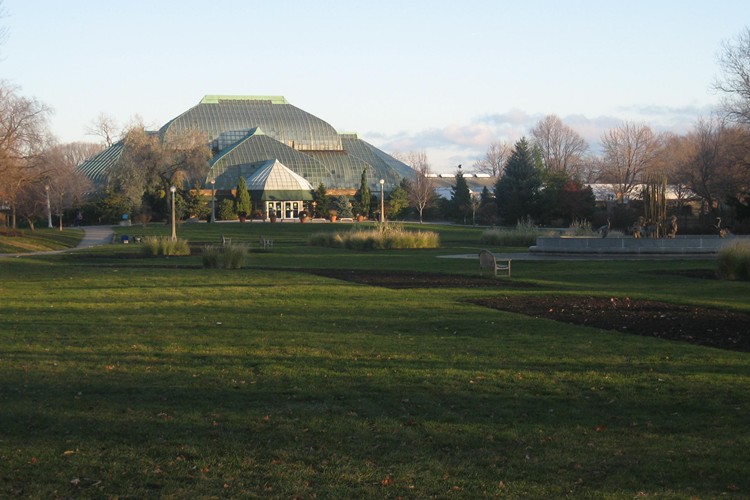Chicago has had the longest streak of above-normal daily temperatures in any November since records have been kept:
The last day of November will see Chicago's 27th record-setting consecutive day with above-normal temperatures. Warmer readings are likely Tuesday as southwesterly winds and abundant sunshine allow afternoon high temperatures to approach and even exceed 50 degrees at many observation points around the metro area. A cold front should pass through Chicago early Wednesday, followed by a sudden turn to colder weather with falling temperatures.
In practice, this means that November felt like October, which, because of the 20 days of below-normal temperatures that month, felt like November. The forecast calls for a normal December, and who-knows-what in 2010.
Tomorrow we look forward to the correction: after the day's high of 11°C at midnight, a slow slide to -2°C before the snow pushes in on Wednesday. Yummy.
Why it's important to get your scanner settings correct:

Duh. Film setting, dude. Film setting.
The bed is just a suggestion, apparently:

I did, in fact, fly yesterday. As usual, here's the Google Earth track.
It looks like I might fly this afternoon:

I've had to postpone my annual flight review four times because of weather. Finally, today, the forecast calls for what you see above: clear skies, light winds, cold temperatures. (It's 0°C this morning.)
As usual, the primary color is gray:

There's a rumor we will have sunlight tomorrow. Unconfirmed.
Pilot and author James Fallows is thankful for the reasonable and minimal changes to New York City airspace the FAA announced last week:
When regulators and security officials address a problem through minimal rather than excessive rule-setting and interference or panicky over-reaction, that is worth our thankfulness too. Building toward a crescendo of things to be thankful for at this time of year.
By the way, it's a very fun trip for private pilots:

(From a flight I took in March 2000.)
Not Always Right, vigniettes that demonstrate how customer stupidity is an absolute limit on customer service:
Me: "Thank you for calling ***. How may I help you today?"
Caller: "I'm having problems with my computer and–"
(Suddenly, what sounds like an air raid siren sounds off in the background.)
Me: "Ma'am, I apologize. I was unable to hear what you said."
Caller: "Stupid tornado warnings! They always make it hard to talk on the phone."
Me: "Oh...should I let you go?"
Caller: "Nah. This happens all of the time."
(In addition to the siren, I hear a door slam and the sound of someone else entering the room. I hear a male voice who I guess is the caller's husband.)
Caller's husband: "D*** it woman, are you crazy?! Get to the basement!"
Caller: "Oh, I guess I should go..." *hangs up*
There are 275 more pages of them. Lovely.
Carl Kasell is retiring December 30th:
Kasell will, however, continue as official judge and scorekeeper of the Chicago Public Radio-produced quiz program, "Wait Wait … Don't Tell Me!," "the show that turned him from a newsman into a rock star," as noted in a memo to staff Monday from David Sweeney, NPR's managing editor for news, and Margaret Low Smith, its vice president of programming.
Sigh.
The Chicago Tribune today has an in-depth article about the misuse of autism research in therapy:
In his letter, obtained by the Tribune, [Florida family physician Dr. Dan] Rossignol justified the unorthodox treatment in part by writing that "a recent study out of Johns Hopkins has shown that children with autism have evidence of neuroinflammation on autopsy and (cerebral spinal fluid) evaluations."
It was [Dr. Carlos] Pardo's study.
Rossignol did not mention that Pardo's team had written in its online primer, using capital letters for emphasis, that intravenous immunoglobulin "WOULD NOT HAVE a significant effect" on what they saw in the brains of people with autism.
"THERE IS NO indication for using anti-inflammatory medications in patients with autism," the team wrote.
There's a word for doctors who offer treatments to desperate people without any evidence that the treatments will work. Or, to put it another way, if it walks like a duck...
I have some experience dealing with the allure of long-shot treatments for diseases that no one actually understands. Fortunately my mother was a solidly rational person, so when she volunteered for an experimental treatment, she understood the possibility—one in three, in fact—that she would only get a placebo, and the bigger possibility that the drug wouldn't work anyway. And the experiment was conducted by an actual science team with actual experimental methods and an actual study-review board.
Quacks are dangerous because desperate people don't usually think rationally. Undergoing dangerous, not to mention costly, treatments that come from shaky foundations and incomplete research do far more harm than good. The hope these treatments bring has a cost that many families don't understand until, much later, they regain their rationality. Then they find that only the quacks have really benefitted.